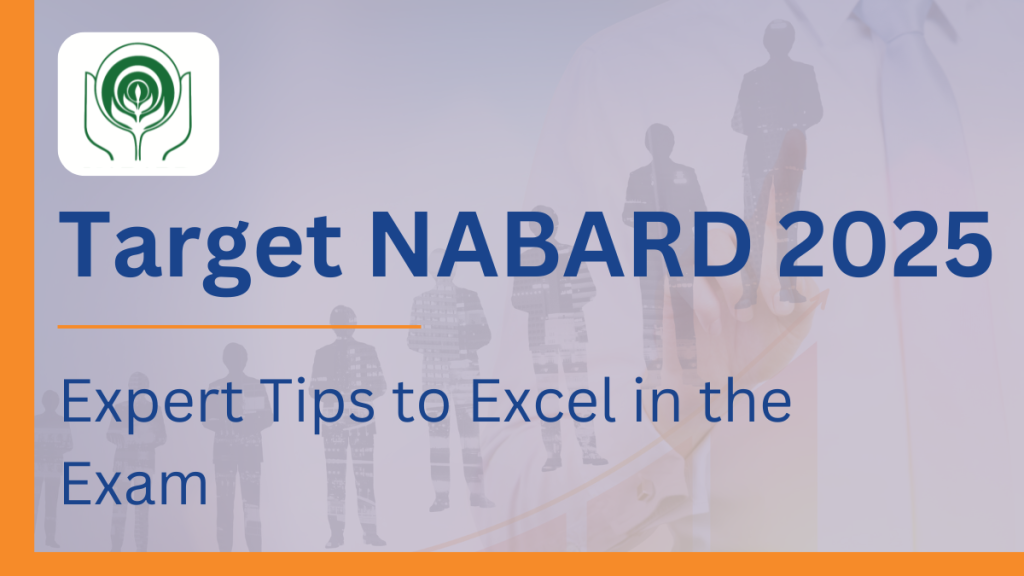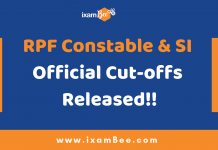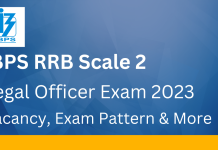Are you someone who aspires to build a long-lasting, fulfilling career in the banking industry or looking to qualify for NABARD 2025? If yes, then the NABARD 2025 exam could be your gateway to success. This highly competitive banking test is one of the toughest exams in the industry, and clearing the NABARD Preliminary exam is the foremost step to achieving your dream job.
We understand that preparation for this NABARD Grade A Exam 2025 can be quite challenging. It requires dedication, hard work, and a clear strategy to make the most of your time and resources. However, with the right mindset and expert guidance, you can greatly enhance your chances of success.
But the first step to achieving your dream job in the banking industry is clearing the NABARD Preliminary exam. To increase your chances of success, we have gathered five expert tips that will help you in qualifying for NABARD 2025.

Tip 1: Target 50% Completion Before Moving On
NABARD’s examination syllabus covers a wide range of subjects, including Quantitative Aptitude, Reasoning, English Language, and Decision Making. To effectively prepare for each subject, consider adopting the “cover 50% then start with the next subject” approach. This strategy ensures that you allocate sufficient time and attention to each subject, preventing you from rushing through the syllabus.
To implement this method, start by dividing each subject into smaller, manageable sections. Set milestones and ensure that you’ve covered at least 50% of each subject before moving on to the next. This approach promotes a more thorough understanding of the material and increases your retention of important concepts. On top of that, regularly practicing with mock tests will help you gauge your progress and identify areas that need further improvement.
Tip 2: Prioritize Important Topics
Efficient time management is crucial when preparing for NABARD. Begin your preparation by focusing on the most important topics within each subject. For the Quantitative Aptitude section, prioritize topics like percentage, number series, quadratic equations, approximation, and simplification. These topics often carry a significant weightage in the exam, so mastering them can boost your overall score.
Tip 3. Follow a Pattern of Learning
Consistency is key to success in NABARD’s competitive environment. To maintain a steady learning pace, establish a pattern of learning that suits your needs. Create a daily or weekly study schedule that allocates specific time slots to each subject. This structured approach ensures that you dedicate adequate time to every topic and reduces the risk of neglecting any area of the NABARD Grade A syllabus.
Tip 4. Avoid Starting with Quantitative and Reasoning (QRE) Section
While it’s essential to cover all sections of the exam, it’s advisable not to begin the exam with the Quantitative and Reasoning (QRE) section. These sections are known for their complexity and time-consuming nature. Starting with them may consume valuable time that you could use more efficiently in other sections. Instead, consider beginning with sections where you are more confident or find it easier, such as English or Decision Making.
Tip 5. Regularly Practice Mock Tests
Mock tests are invaluable tools in your NABARD preparation. They not only help you assess your progress but also simulate the exam environment, allowing you to become more comfortable with the format and timing. Make it a habit to practice mock tests regularly, and analyze your performance afterward. Identify strengths and weaknesses, and work on improving your weaker areas. Also, reviewing NABARD Grade A prelims previous years’ question papers can provide insights into the exam pattern and the types of questions asked.
Take Inspiration from Previous Subject-wise Cutoffs
Understanding NABARD Grade A subject-wise cutoffs from previous years is a crucial aspect of your NABARD Grade A Prelims exam preparation. These cutoffs represent the minimum scores required to qualify in each section of the exam. By analyzing this data, you can make informed decisions about how to allocate your time and effort during your preparation.
Here’s a breakdown of why you should consider subject-wise cutoffs for Reasoning, Quantitative Aptitude, English Language, and Decision Making:
1. Reasoning (20) (Cut off – 3.75)
| Topic | No. Of questions | Level of questions |
| Seating arrangement | 8 | Moderate |
| Syllogism | 3 | Easy- moderate |
| Inequalities | 2 | Easy- moderate |
| Blood relation | 1 | Easy- moderate |
| Distance and direction | 1 | Easy- moderate |
| Puzzle | 5 | Moderate |
- Reasoning is a section that assesses your logical and analytical thinking abilities.
- Analyzing previous years’ cutoffs for Reasoning can help you gauge the level of difficulty and the typical score required to clear this section.
- If you find that the Reasoning section historically had a high cutoff, it may indicate that this section is particularly competitive. In response, you can prioritize your preparation for this area, dedicating more time to practice and mastery.
2. Quantitative Aptitude (20) (Cut off – 3.00)
| Topic | No. Of questions | Level of questions |
| Di pie chart | 5 | Easy moderate |
| Number series | 3 | Easy |
| Simplification and approximation | 2 | Easy moderate |
| Athematic | 6 | Easy moderate |
| Quadratic equations | 3 | Easy moderate |
- The Quantitative Aptitude section evaluates your mathematical and numerical skills.
- Examining past cutoffs for this section can give you an idea of the expected score needed to succeed.
- If Quantitative Aptitude has a reputation for having a higher cutoff, you should focus on strengthening your math skills and practicing extensively in this area.
3. English Language (30) (cut of – 12.50)
| Topic | No. Of questions | Level of questions |
| Reading Comprehension | 7 | Easy moderate |
| Word swap | 5 | Easy |
| Error Detection | 4 | Easy moderate |
| Sentence arrangement | 5 | Easy moderate |
| Fill in the blanks | 5 | Easy moderate |
| Misc | 4 | Easy moderate |
- The English Language section assesses your proficiency in English grammar, vocabulary, and comprehension.
- Reviewing previous years’ English Language cutoffs can provide insights into the level of language proficiency required.
- If the cutoff for English Language is relatively high, it signals that this section is essential for a successful overall score. You should allocate sufficient time to improve your English skills.
4. Decision Making (cut off – 1.50)
| Topic | No. Of questions | Questions (shift 2) |
| Decision making techniques | 2 | 2 |
| Type of decision | 2 | 2 |
| Decision making style | 2 | 1 |
| Decision making theory | 1 | 2 |
| Bias in making decisions | 2 | 2 |
| Decision matrix | 1 | 1 |
- Decision Making is a unique section in NABARD exams, testing your ability to make ethical decisions.
- Examining past cutoffs for Decision Making can help you understand the scoring trends.
- If Decision Making has a notable cutoff, it indicates the importance of preparing well in this area, including practicing ethical decision scenarios and case studies.
Additional Tips for NABARD Grade A Preparation
In addition to the five expert tips mentioned above, consider the following recommendations to further enhance your NABARD Grade A exam preparation:
1. Follow ixamBee’s 40-Days NABARD Study Plan:
- ixamBee’s 40-Day NABARD Study Plan is a structured and comprehensive roadmap designed specifically for NABARD aspirants. This plan offers a day-by-day breakdown of what topics to cover, how much time to allocate to each subject, and when to take mock tests.
- The benefit of such a plan is that it eliminates guesswork from your preparation. It ensures that you cover all subjects systematically, preventing last-minute cramming and reducing the risk of missing essential topics.
- Moreover, this plan helps you pace your preparation effectively, allowing you to make steady progress over the 40 days leading up to the exam. It’s an invaluable tool for time management, helping you strike the right balance between subjects and revision.
2. Utilize Mock Tests and Previous Year Question Papers:
NABARD Grade A Phase 1 Mock tests are a cornerstone of successful exam preparation. They simulate the actual exam environment, allowing you to become familiar with the format, timing, and types of questions you’ll encounter.
- By regularly practicing with NABARD Grade A mock tests, you not only assess your knowledge but also identify your strengths and weaknesses. This insight enables you to fine-tune your study plan, focusing more on areas that need improvement.
- Solving NABARD grade A prelims previous years’ question papers is equally essential. It provides a glimpse into the exam’s historical question patterns and helps you understand the level of difficulty.
- Overall, the combination of mock tests and previous papers enhances your confidence, reduces exam anxiety, and fine-tunes your test-taking strategy.
3. Attend Live Classes by ixamBee:
- ixamBee’s free live and YouTube classes offer an excellent opportunity to supplement your self-study efforts. These classes are often conducted by expert instructors who have an in-depth understanding of the NABARD exam. Below is the list of sechdule NABARD Grade A live classes by ixamBee.
- In these live sessions, you can clarify doubts, ask questions, and receive real-time guidance on challenging topics. Interacting with instructors and fellow aspirants can provide valuable insights and motivation.
- Also, these classes can offer tips, tricks, and strategies specific to the NABARD exam. Having this expertise can give you a competitive edge and enhance your overall preparation.
4. Enroll in NABARD Grade A Online Courses by ixamBee:
NABARD Grade A phase 1 Online course by ixamBee provides a structured and comprehensive learning experience. These courses are designed to cover the entire syllabus in a detailed and organized manner. Enrolling in these courses ensures that you receive expert guidance and access to high-quality study materials. It’s particularly beneficial if you prefer a more guided and structured approach to your preparation.
Conclusion
Qualifying for the NABARD Grade A exam requires meticulous planning, consistent effort, and a strategic approach to each subject. By following the expert tips outlined in this article, along with subject-wise cutoff insights, you can significantly increase your chances of excelling in the NABARD Grade A exam.
Remember that success in such competitive exams is the result of dedication, practice, and a well-thought-out study plan. Best of luck in your NABARD journey!
ixamBee specializes in providing expert guidance and resources for banking exams 2024, ensuring that you are well-prepared for the Upcoming Bank Exams like RBI Grade B, NABARD Grade B, IBPS SO, and more. Our courses align with the bank exam calendar 2024, covering all the essential topics. With a focus on the upcoming bank jobs, our Previous Year Papers, BeePedia, SSC CGL, SSC CHSL, SSC MTS and other Mock Tests are designed to help you excel in upcoming banking exams.
Also Read:
Preparation Strategy for NABARD GRADE A Prelims Exam
How to Study ARD and ESI for NABARD IT and Finance Exam
NABARD Grade A Phase 2 Exam Analysis














